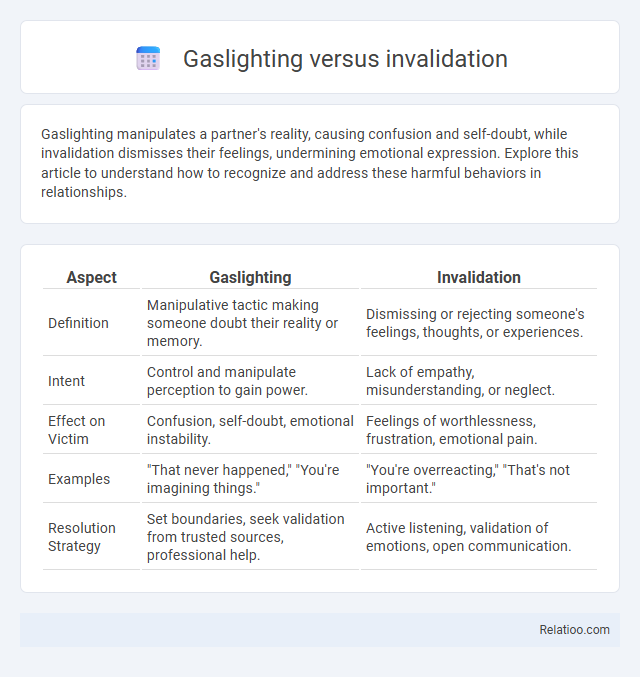Gaslighting manipulates a partner's reality, causing confusion and self-doubt, while invalidation dismisses their feelings, undermining emotional expression. Explore this article to understand how to recognize and address these harmful behaviors in relationships.
Table of Comparison
| Aspect | Gaslighting | Invalidation |
|---|---|---|
| Definition | Manipulative tactic making someone doubt their reality or memory. | Dismissing or rejecting someone's feelings, thoughts, or experiences. |
| Intent | Control and manipulate perception to gain power. | Lack of empathy, misunderstanding, or neglect. |
| Effect on Victim | Confusion, self-doubt, emotional instability. | Feelings of worthlessness, frustration, emotional pain. |
| Examples | "That never happened," "You're imagining things." | "You're overreacting," "That's not important." |
| Resolution Strategy | Set boundaries, seek validation from trusted sources, professional help. | Active listening, validation of emotions, open communication. |
Understanding Gaslighting: Definition and Key Features
Gaslighting is a psychological manipulation tactic where the perpetrator deliberately distorts facts to make the victim doubt their perception and memory, leading to confusion and self-doubt. Unlike invalidation, which dismisses or minimizes feelings and experiences, gaslighting systematically undermines reality to exert control. Core features include persistent denial, falsification, and contradiction aimed at destabilizing the victim's sense of truth and mental stability.
What is Invalidation? Essential Concepts
Invalidation occurs when your feelings, thoughts, or experiences are dismissed or minimized, undermining your reality and emotional state. It differs from gaslighting, which involves manipulating you into doubting your sanity, while invalidation simply rejects or ignores your perspective. Recognizing invalidation helps maintain emotional health by validating your experiences and reinforcing your self-worth.
Gaslighting vs Invalidation: Core Differences
Gaslighting manipulates perception by making victims doubt their reality, memory, or sanity, while invalidation dismisses or negates a person's feelings or experiences without necessarily altering their sense of reality. Gaslighting often involves deliberate psychological manipulation aimed at control, whereas invalidation may be unintentional and stems from misunderstanding or disregard. Identifying gaslighting requires recognizing persistent deceit and distortion, whereas invalidation is recognized through emotional neglect and disregard for personal validation.
Psychological Impact of Gaslighting
Gaslighting profoundly disrupts Your sense of reality by causing confusion, self-doubt, and emotional instability, leading to long-term psychological trauma such as anxiety and depression. Unlike invalidation, which dismisses feelings or experiences, gaslighting manipulates and distorts facts to erode Your confidence and trust in your own perceptions. This psychological impact often results in diminished self-esteem, increased vulnerability to manipulation, and challenges in establishing healthy relationships.
Emotional Consequences of Invalidation
Gaslighting and invalidation both undermine your perception, but gaslighting distorts reality to make you doubt your sanity while invalidation dismisses your feelings and experiences as unimportant or wrong. Emotional consequences of invalidation include feelings of worthlessness, increased anxiety, depression, and a damaged sense of self-worth. Persistent invalidation can erode your confidence, making it difficult to trust your emotions and communicate your needs effectively.
Recognizing the Signs of Gaslighting
Gaslighting involves manipulating someone into doubting their own reality, often through persistent lying and denial, leading to confusion and loss of confidence. Invalidation dismisses or undermines another person's feelings or experiences without necessarily distorting reality, causing emotional pain and self-doubt. Recognizing gaslighting signs includes noticing frequent contradictions, denial of facts, and strategic distraction that leave the victim questioning their memory and perception.
Common Examples of Invalidation in Daily Life
Common examples of invalidation in daily life include dismissing Your feelings by telling You "You're overreacting," ignoring or belittling Your experiences, and refusing to acknowledge Your perspective during conflicts. Gaslighting involves manipulating reality to make You doubt your own memory or perception, while basic invalidation simply denies or minimizes Your emotions without distorting facts. Recognizing these behaviors is crucial for maintaining healthy communication and emotional well-being.
Why People Gaslight vs Why People Invalidate
People gaslight to manipulate others by distorting their perception of reality, often to maintain control and power in a relationship. In contrast, people invalidate by dismissing or minimizing others' feelings and experiences, usually due to discomfort, lack of empathy, or misunderstanding. Gaslighting is a strategic form of psychological abuse, while invalidation often stems from ignorance or emotional insensitivity.
How to Respond to Gaslighting and Invalidation
Gaslighting and invalidation both undermine your perceptions, with gaslighting distorting reality to make you doubt yourself, while invalidation dismisses your feelings or experiences outright. To respond effectively, remain grounded in your truth by calmly stating your perspective and seeking external validation from trusted sources or evidence. Establish clear boundaries and prioritize self-care to maintain your mental and emotional well-being amidst these manipulative tactics.
Seeking Help: Healing from Emotional Manipulation
Seeking help for gaslighting involves recognizing the persistent pattern of psychological manipulation that distorts reality and undermines self-trust. Invalidation therapy addresses experiences where a person's feelings or experiences are dismissed, emphasizing validation to restore emotional integrity. Effective healing from emotional manipulation combines counseling, support groups, and educational resources to rebuild confidence and establish healthy boundaries.

Infographic: Gaslighting vs Invalidation
 relatioo.com
relatioo.com